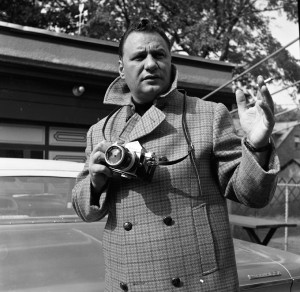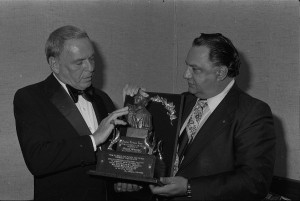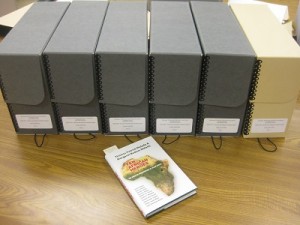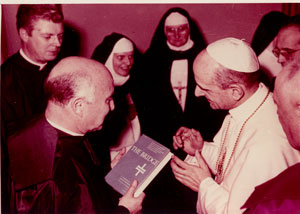
The Ace Alagna photographic collection, 1944-1998, Mss 0018, is a unique, rich resource depicting the history of Newark, the Italian American community in and around Newark, New Jersey politics, people, places, and events in beautiful black and white. This collection, which has more than 2,000 images already available online through the Ace Alagna photographs digital collection, has about 40,000 items including photographic negatives, prints, videos, and layout sheets from the Italian Tribune newspaper. Now, a finding aid describing the almost 30,000 negatives in the collection has been completed and is available online.
Ace Alagna was a photographer from Newark who worked in the White House Press Corps before buying the Italian Tribune newspaper. He edited the newspaper for almost 30 years, during which time he and the Italian Tribune were the organizers and main sponsors of the Newark Columbus Day parade. The annual parade usually had a celebrity grand marshal, often someone of Italian heritage, who would be present for the parade and attendant celebrations. Ace Alagna knew a wide a range of people in New Jersey, and traveled around the country and around the world.

The Ace Alagna photographic collection, 1944-1998, Mss 0018, includes images of notable politicians, actors, athletes, musicians, and writers such as John F. Kennedy, Lyndon B. Johnson, Richard Nixon, N.J. Governors Richard Hughes and Brendan Byrne, Congressman Peter Rodino, Danny Aiello, Frank Sinatra, Connie Francis, Phil Brito, Joe DiMaggio, Joe Piscopo, Tony Curtis, Bob Hope, and Tony LoBianco, among many others. The collection includes numerous pictures of Newark and the Columbus Day parade from the 1970s-1990s, and a large number of pictures of N.J. politicians in the state senate and assembly.
Many of the images in the collection have been scanned, and so far a small percentage of those scans are available online. There are also unprocessed portions of the collection that have not yet been described in the finding aid, particularly black and white and color prints of many of the negatives, videos related to the Columbus Day parade, and some materials that appear to be layouts for images to appear in the Italian Tribune. Materials that are not available online are available for research, with the assistance of Archives staff, at the Archives and Special Collections Center. Additional scans will be made available online in the future, as time permits, and unprocessed materials will be added to the finding aid as they are processed. Keep an eye out for more images and materials, and meanwhile, take a close look through this rich window into Newark’s history and culture!

